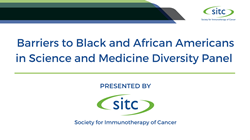
“As an organization, SITC is acutely aware of our unique opportunity to elevate and support a diverse cancer research community. The experiences of these panelists are illustrative of the work yet to be done and the power mentors and membership organizations have to make a difference.”
MILWAUKEE (PRWEB)
October 05, 2022
The Society for Immunotherapy of Cancer (SITC) is pleased to make available an important diversity panel discussion of society leaders sharing their experiences as Black and African Americans working in the scientific and medical research fields.
Hosted by the SITC Diversity, Equity and Inclusion Task Force, “Barriers to Black and African Americans in Science and Medicine Diversity Panel” is an hour-long group discussion featuring society leaders who share personal and professional reflections as Black and African Americans working in science and medicine in the United States. The recorded webinar is moderated by SITC Vice President and Task Force Co-chair Leisha Emens, MD, PhD and SITC Board Member and Task Force Co-chair, Adekunle Odunsi, MD, PhD, who also serves as a panelist. Additional Diversity Panel members include:
-
Charlie Garnett-Benson, PhD – Bristol Myers Squibb - Chelsea Pinnix, MD, PhD – The University of Texas MD Anderson Cancer Center
- Avery Posey, PhD – University of Pennsylvania Perelman School of Medicine
“SITC is honored that our members participated so openly and honestly in this panel,” commented Mary Dean, JD, CAE, SITC Executive Director. “As an organization, SITC is acutely aware of our unique opportunity to elevate and support a diverse cancer research community. The experiences of these panelists are illustrative of the work yet to be done and the power mentors and membership organizations have to make a difference.”
Despite the fact that Black people represent 13.4% of the U.S. population, only 7% of science and engineering doctorate recipients are Black and only 3.1% of the scientific research faculty in the United States are African American. Looking at recent medical school graduates, internal medicine residents and oncology fellows, a small percentage – between 3.9 and 6.2% – are Black (1). Furthermore, according to a report on workforce disparity, where a total of 82 (80%) cancer centers responded – including 64 NCI-designated and 18 emerging (nondesignated) centers – it was reported that 2.4% of Directors were Black, 0% of Deputy Directors were Black, 5.8% of Associate Directors were Black, and 1.5% of Research Program Leaders were Black (2).
“This data illustrates a gross underrepresentation of Black and African American professionals in science and medicine,” said Dr. Emens. “There is very clearly room for progress to be made and the SITC Board is committed to continuing to bring opportunities that promote and enhance diversity in the field. I appreciate all of the panel participants’ contributions to the discussion, and I hope the experiences offered serve as a learning opportunity for the biomedical community.”
The SITC diversity panel discussion is available for on-demand viewing via the SITC YouTube channel and the SITC website.
About SITC
Established in 1984, the Society for Immunotherapy of Cancer (SITC) is a nonprofit organization of medical professionals dedicated to improving cancer patient outcomes by advancing the development, science and application of cancer immunotherapy and tumor immunology. SITC is comprised of influential basic and translational scientists, practitioners, health care professionals, government leaders and industry professionals around the globe. Through educational initiatives that foster scientific exchange and collaboration among leaders in the field, SITC aims to one day make the word “cure” a reality for cancer patients everywhere. Learn more about SITC, our educational offerings and other resources at sitcancer.org and follow us on Twitter, LinkedIn, Facebook and YouTube.
(1) Winkfield, K. M., Levit, L. A., Tibbits, M., Melnick, E., Schenkel, C., Kirkwood, K., Green, S., & Pierce, L. (2021). Addressing equity, diversity, and inclusion of black physicians in the oncology workforce. JCO Oncology Practice, 17(5), 224–226. https://doi.org/10.1200/op.21.00079
(2) Bin Han Ong, M., & Goldberg, K. (2020). First-ever TCL-AACI study of the leadership pipeline points to urgent need for more diversity at elite cancer centers. The Cancer Letter, 46(38). Retrieved 2022, from https://cancerletter.com/the-cancer-letter/20201009_1/.
Share article on social media or email:

